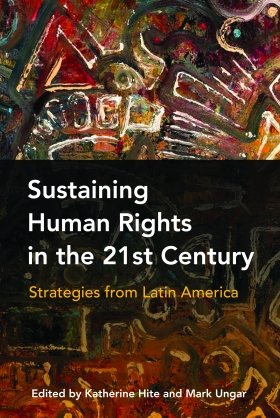Sustaining Human Rights in the Twenty-First Century: Strategies from Latin America


-
These essays take a much-needed look at the course of human rights strategies rooted in the last century’s struggles against brutally repressive dictators. Those struggles continue today across Latin America. Augmented by the pursuit of broader political, cultural, labor, and environmental rights, they hold accountable a much wider cast of national governments, local governments, international agencies, and multinational corporations.
In Sustaining Human Rights in the Twenty-first Century, some of the Western Hemisphere’s leading human rights experts shape and bolster new approaches, from the concepts of rights to transnational efforts, by placing the struggle for rights in historical and comparative perspective. The contributors provide an historical framework, describe formal and legal institutions, and discuss the citizens’ movements and conceptions of citizenship that produce distinct kinds of political identities and struggles.
The contributions in this volume are the product of the Wilson Center’s June 2009 conference “Human Rights: Challenges of the Past and Challenges for the Future,” held in honor of historian Margaret E. Crahan, whose contributions to human rights scholarship and activism have been essential to the discipline.
Katherine Hite is a professor of political science and the Frederick Ferris Thompson Chair at Vassar College in Poughkeepsie, New York. She is the author of Politics and the Art of Commemoration: Memorials to Struggle in Latin America and Spain. Mark Ungar is a professor of political science and criminal justice at Brooklyn College and the City University of New York Graduate Center. He is author of Policing Democracy: Overcoming Obstacles to Citizen Security in Latin America.
Editors
Katherine HiteProfessor of political science and the Frederick Ferris Thompson Chair at Vassar College. Mark UngarFormer Fellow;
Mark UngarFormer Fellow;
Associate Professor, Brooklyn College- City University of New YorkLatin America Program
The Wilson Center’s prestigious Latin America Program provides non-partisan expertise to a broad community of decision makers in the United States and Latin America on critical policy issues facing the Hemisphere. The Program provides insightful and actionable research for policymakers, private sector leaders, journalists, and public intellectuals in the United States and Latin America. To bridge the gap between scholarship and policy action, it fosters new inquiry, sponsors high-level public and private meetings among multiple stakeholders, and explores policy options to improve outcomes for citizens throughout the Americas. Drawing on the Wilson Center’s strength as the nation’s key non-partisan policy forum, the Program serves as a trusted source of analysis and a vital point of contact between the worlds of scholarship and action. Read more
Browse Insights & AnalysisExplore More
Browse Insights & Analysis
Iraq Should Consider Extending UNAMI’s Mission
Posted date/time:
Middle East Dialogue February 2025 Meeting Report
Posted date/time:

